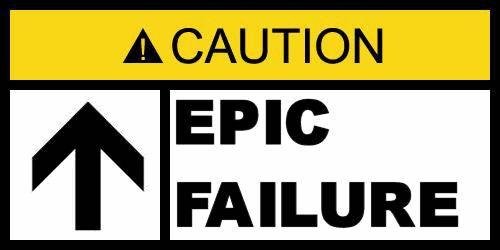 Some of us like standing apart from the crowd – just to be different.
Some of us like standing apart from the crowd – just to be different.
Success is boring. But that is not the reason why I’m a big fan of failure.
I worked for a dotcom in the late 1990s. It was one of those public companies ingloriously chronicled by the subtly named fuckedcompany.com, the anonymous gossip site for disgruntled insiders of imploding dotcoms.
However, it was the most memorable professional experience I’ve ever had. I learned the most, experienced the most, even though my choice of employer was a failure according to the usual metrics of success – high salary or stock options that help you retire. The company went under with all the other dotcoms, another tombstone in the dotcom graveyard. But I had the time of my life.
I was just out of college and yet found myself in an big role as an early employee – dealing with investors, industry analysts, lawyers, negotiating deals, defining key product features, hiring executives making four times my salary, and the one that tickles me the most – leading the effort to go public through an SEC filing! I guided the lawyers and our team through a couple of rounds of questions from the SEC after our initial filing. You can’t make this stuff up.
I felt like I had a stake in the company, not just because of my options, but because I could have an impact – I felt like I was in a position that was consequential enough to help it succeed or go under. It felt like my role mattered, even when I was needled as ‘Mini-CEO’, after the Austin Powers’ character Mini-Me.
In the boiler room environment of a startup team, which is sometimes sprinkled with big company people who can’t hack it, we had our share of politics, tensions and incompetence. Hire slowly, fire quickly – that was one of the lessons.
You also learn to speak truth to power. I had to tactfully go over the head of the marketing chief when he ridiculously insisted that a phrase he used in a press release was grammatical. He wanted to put an ‘a’ in front of a word that started with a vowel. Egos are unwelcome in a true team.
My job really improved my salsa dancing. When you’re happy at work, you not only have a decent work-life balance – you’re having more fun during your spare time. It also helps if you see work as play.
Yes, I was not much richer out of the experience materially, but I had war stories, and a colorful experience that none of my peers could match. It was a rich failure. Little victories were peppered within that failed experience, such as winning that SEC approval.
Even unmitigated failure can hold important lessons for us. Failure makes us stronger, more aware of the signs of failure, and less enamored of perfectionism.
I posed a related question to an entrepreneurship panel in Boston. If you have a couple of projects you want to launch – do you have a higher chance of making the second one fly if you fail at the first? And hence should you launch your more promising idea second? It elicited laughter and some confusion among the audience and panelists. In retrospect, I wouldn’t recommend postponing your best ideas and aspirations. Do whatever first you’re the most passionate about that you can feasibly do, and don’t obsess over failure or success. Life is short. Have fun.
Failure, ultimately, makes us more likely to succeed. A culture that tolerates, rewards and celebrates the experience of failure has allowed Silicon Valley to become one of the most innovative places on earth.
And you can’t argue with success.




